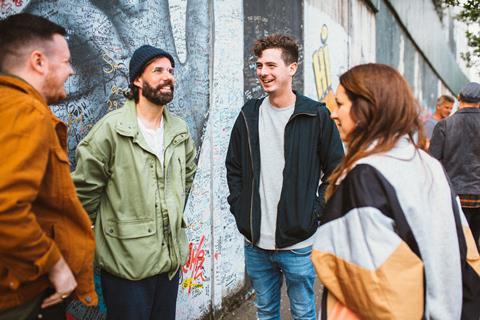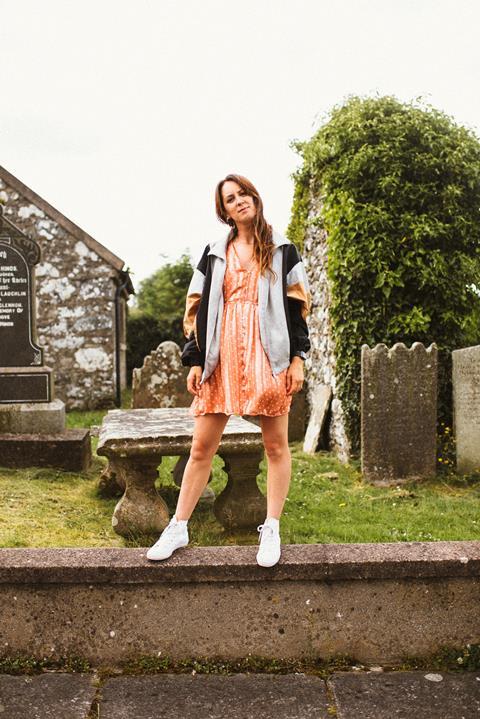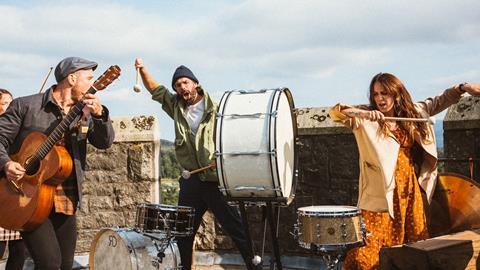Rend Collective’s rise to prominence has been swift. When I first met the band in 2011, shortly after the release of their debut album Organic Family Hymnal, the Irish folk collective were playing to a modest crowd in a small church. They’ve since moved to America, toured massive venues and sold over 1 million copies of their hit single ‘My Lighthouse’. Other popular tracks including ‘Build Your Kingdom Here’ and ‘Rescuer’ are staples both on Christian radio and in hundreds of churches. They’ve even become the only Protestant band to play for the Pope.
Founding members of the collective, married couple Gareth and Ali Gilkeson, seem to be taking all of this in their stride. When we connect over Zoom – with Ali at home in Nashville, and Gareth wandering around an airport in Florida – I’m struck by how the success and relative fame they’re experiencing hasn’t changed them. Their openness is refreshing (most artists are too proud to admit one of their recent records was “a bit of a flop”).
The move from Ireland to America was a result of “the quickest answer to prayer anyone has ever got”, Gareth says. It came in the form of an email from popular worship leader Chris Tomlin, inviting the band to join him on a tour of the USA. The offer was so out of the blue, some band members assumed it was a friend playing a prank on them.
In 15 years, Rend’s mission has remained largely the same. Seeing themselves as a worship band for people who don’t go to church, they’ve committed to preaching the gospel at every concert. Sharing their faith is number one priority, and they’ve been willing to do it at the cost of their own finances, as well as their reputation (the band were criticised for sharing a stage with Franklin Graham last year).
Alongside their evangelism, Rend have also been consistent in banging the “seriousness is not a fruit of the spirit” drum. They’ve been relentless in dishing out the humour – something desperately needed in certain circles where Christians are often guilty of taking themselves way too seriously. A good litmus test for whether or not you’re likely to be a fan of Rend Collective is the extent to which you’re comfortable with men and women leading worship while wearing Panda costumes.
What happened when you first left Ireland to live in the USA?
Ali: We would serve at Passion City Church in Atlanta on Sundays and then play shows during the week. It just kind of snowballed from there. People started trying to book you, so we had to get a booking agent and manager. We were touring so much, and I remember for the next few years just being in a state of exhaustion.
Gareth: Yeah, we were sleeping on the floor…
Ali: Or in a van
Gareth: There was no glitz and glamour about it. We had $60 a month as our pocket money - and that was up until probably five years ago.
At the time your fans in the UK were looking at your move to the US, seeing you tour these incredible venues, your social media followers going up and up, getting airplay on Christian radio…they thought you were living the dream! Why weren’t you benefitting financially from the success?
Gareth: You just had to pay your dues, you know. All the money that we were making was going back into the machine of Rend Collective – to try and pay for touring costs. One of the tours that we did in 2012, we actually had to pay $1,000 a night to be allowed on the stage. You know, it’s business over here as much as everything else, which is obviously a thing that we don’t hugely love, and we try and we live in a way that we feel most comfortable with at all.
But also, the music industry has changed. I think everybody at home thinks we’re now billionaires! But with the arrival of Spotify, and all of that, you do music because you love it, you don’t do it to make money.

I think it’s becoming more widely known that putting your music on a streaming platform won’t pay the bills for most artists. Until recently, bands were able to survive mainly thanks to touring. But with the arrival of Covid, touring has become impossible. So how have you made a living?
Gareth: I don’t think there’s been anything we have done this year that has actually generated enough money to sustain us. But we had savings from the business, and there’s also a couple of grants from the US government, and the UK government. Royalties have come in at the right time, and people have been generous to us as well and that’s been fantastic. We have 200 Patreon subscribers - people who give monthly to the ministry, and that’s a huge help.
I think it took us too long to realise we’re not really a band, we are more of a ministry. We do things where the bottom line and the financial implications aren’t the thing that drives it. We went to Australia last year, and we’re like, “Are we going to break even? I don’t know. But we need to do what God calls us to do.” And that makes it more fun.
What have been those moments where you’ve realised ‘we’re a ministry’?
Ali: A simple song like ‘My Lighthouse’ - we’ve seen it being played in most primary schools across the UK. And over this past year we’ve been able to do these Zoom calls with fans and learned we’ve been a part of people’s stories, whether they’ve been battling with health issues, or marital issues, or depression. To know that you’re involved in their lives and they’ve been using a song that you’ve written is really, really special. You instantly have these connections with people worldwide.
Gareth: As a band, we made the decision, about two years ago, that we would preach the gospel at all our concerts, which is not really something that a band does, and it’s kind of old school. So on our Canadian tour, which was just before Covid, we saw 1,500 people give their lives to Jesus on that six week tour, which is huge. Another great example of that was when we were in Shepherds Bush, London, and one of the bar staff broke down in tears, and God met her there and then. One of our friends went over and started speaking to her and she gave her life to God.
That feeling of being able to walk off stage and say: “well, maybe the concert was okay, but wasn’t that awesome that 40 people gave their lives to God tonight?” We’ve always felt like we’re more a worship band for people who don’t go to church, than we are a worship band for people who love church.

Ali, I’m aware that both the music world and the Christian world can be quite male dominated. Has that been your experience?
Ali: I mean, absolutely! I’ve done so many tours, where I’ve been the only girl on stage for the entire evening. And I’ve been on tour buses full of men for the past ten years and it’s definitely a smelly experience!
What I normally saw growing up in church was, if women were on stage, they were singing in the background and it was quite static. And for me, what I really wanted to bring to the worship world was not to be afraid to express yourself – maybe in some strange ways. I was playing instruments like trash cans, ukuleles and accordions. I remember people saying, “What is this Irish woman doing just picking up random things?” But for me, worship doesn’t have to be done with a serious expression. You can sing with a smile on your face, you can dance, you can move.
It can be quite daunting. But I’ve noticed ever since we started, I see all these other women rising up and I’m like: “yes go for it!” I get so many young women coming up to me and being like: “Thank you. You really show me that I don’t need to hold back - I can be a girl drummer too.”
You’ve said before that ‘Counting Every Blessing’ emerged out of a time of “downheartedness” as a band. What brought you to that low point? And how did the song emerge out of that?
Gareth: We had just brought out The Art of Celebration, and that record had gone huge for us worldwide. Then we had signed a new record deal with a different label and they had wanted us to bring out another record quite quickly. Ali had said: “I don’t know why you’re bringing out another record, this is stupid. You know, this other one’s still selling thousands a week, why would you be doing this?” And I guess we listened to executives over our wives, which is always a mistake.
The next record was a bit of a flop in comparison. I remember all of us just feeling really downbeat. We had this euphoric sense of “we’re climbing, we’re going high, we’re going to take over the world.” And then experiencing that flop, I was totally gutted. I felt like I had let the team down and I let God down. I was looking around at the success of other people - which is always a dangerous thing to do. A friend said to me: “comparison is the thief of joy.” And that just really resonated with me. The idea of counting every blessing came out of that moment. And since writing that song together, both Chris and I would say keeping a note of what you’re grateful for is huge, it’s so good for your mental health and your spiritual health.
What does family life look like for you both, especially when you’ve been touring and trying to raise three kids at the same time…
Ali: Life with kids on the road is definitely busy and chaotic. You have to let a lot of things go, like sleep routines and bathing! It’s quite unique. I don’t really know anyone else who has done it like we’ve done it. We’re very much people who believe you don’t stop your ministry to have kids, you just bring your kids along as much as you can.
As hard as it’s been - lack of sleep and all the logistics of flying internationally with kids four times a year meaning everyone’s always jet-lagged - it’s been really incredible.
People often ask me about balance. There’s not balance. For me, I don’t concentrate on trying to split my time and trying to be a mum here and a minister there. It’s all encompassing. I think the moment that you try and get those two things to battle, you’re in a losing match. And so you have to make sure you’re always pulling in the same way; that your ministry, your marriage and your family life are all on the same side as Jesus.
You’ve started a new ministry called Rend Collective Kids. How did that come about?
Ali: We were at that point of: “if I have to listen to ‘The Greatest Showman’, or ‘Baby Shark’ one more time, I’m gonna lose my mind.” Gareth and I thought it was time to write some fun kids worship songs. And it was great because you have all these limitations when writing regular worship music, but you can just do whatever the heck you want with kid’s music! You can change time signatures, you can put random lyrics in, you can put pandas in the song… And so it turned out to be a really fun project.
We wanted to be the Pixar of Christian kids work – something the parents are going to enjoy too. And then I wrote the book to go along with ‘My Lighthouse’ as well. I worked on that with Natasha Debnam from the UK. She’s a fabulous artist. It’s still one of my favourite books to read to my kids – as embarrassing as that sounds!
When you originally wrote the song ‘My Lighthouse’ did you have a younger audience in mind at all?
Gareth: None whatsoever! It turns out that us trying to be the most deep and meaningful that we could be seems to resonate with children more than anybody else…
Ali: It was only after we brought out the song and we were traveling round all these churches I realised there’s lighthouses in all of these buildings. There’s pictures of lighthouses. There’s rugs of lighthouses…
Gareth: Yeah, I would go as far to say the lighthouse is the biggest secular image used by the Christian church. I guess that’s why the song resonated.
Your music has been heard and enjoyed across the denominations. And worship music in general seems to be quite powerful in bringing Christians from different backgrounds together. Yet often, online, it can seem like Christians are very divided. Have you seen the best and the worst of this?
Gareth: We are delighted that we aren’t affiliated with a specific church. At certain times, I thought that was a negative. But the fact that we have the ability to play everything from the Billy Graham organisation (which we got a lot of trouble for) to playing for the Pope in Ireland (and got a lot of trouble for that) and Hillsong in Australia and the mega churches in the US is great.
And certainly coming from Northern Ireland, unity is a huge deal. We know what a fractured community is. We know what it is when you build walls, not bridges. And, I mean, you really break it all down, aren’t we just the same people, trying to love the same God?
I’ve noticed that when people argue online, if they were sitting across a table, and they had a cup of tea in their hands, and sharing some cake, they’d probably be the best of friends. I would say that the tribalism is a huge issue and the reason why the prayer that Jesus prayed 2000 years ago [John 17] hasn’t been answered yet.
How have you dealt with the negativity and criticism?
Gareth: I’m a real people pleaser, I want everybody to get along. I don’t want to offend anybody. I lie in bed thinking: “oh, I wish I could talk about that more or that person could understand why we did that.”
The Billy Graham organisation was one where there were huge media issues in the UK because we were doing it. And all we wanted to say was: “well, the Gospel is for everybody.” I wish I could just have more time with people to explain why you do certain things. You don’t always get that chance.

Tell me a bit more about playing for the Pope – because you are the only Protestant band to have done that…
Ali: It was very unique, and quite overwhelming as well. We were just outside Dublin. And you would see him driving past in his golf cart and be like: ‘Oh there’s the Pope!’
Gareth: It’s not a golf cart, Ali. It’s the Popemobile!
Ali: [Laughs] Yeah, it was a really special time. Obviously, we got a lot of flack for it. But we really do believe in unity and we believe in building bridges. So it was a really unique opportunity to play songs that we’ve written, like ‘Build Your Kingdom Here’, at a really pivotal time for Ireland.
What can we expect from Rend Collective in the coming months?
Gareth: We are praying that we’ll be able to do our shows in the UK in November. And we’re praying that those are going to be amazing, it’s going to be like an end of pandemic celebration.
We’re also praying that we will get home to our families in Northern Ireland, it’s been a long time. We can’t wait to get home and see our mums.
To hear the full interview listen to Premier Christian Radio at 8pm on 5 June or download The Profile podcast





































